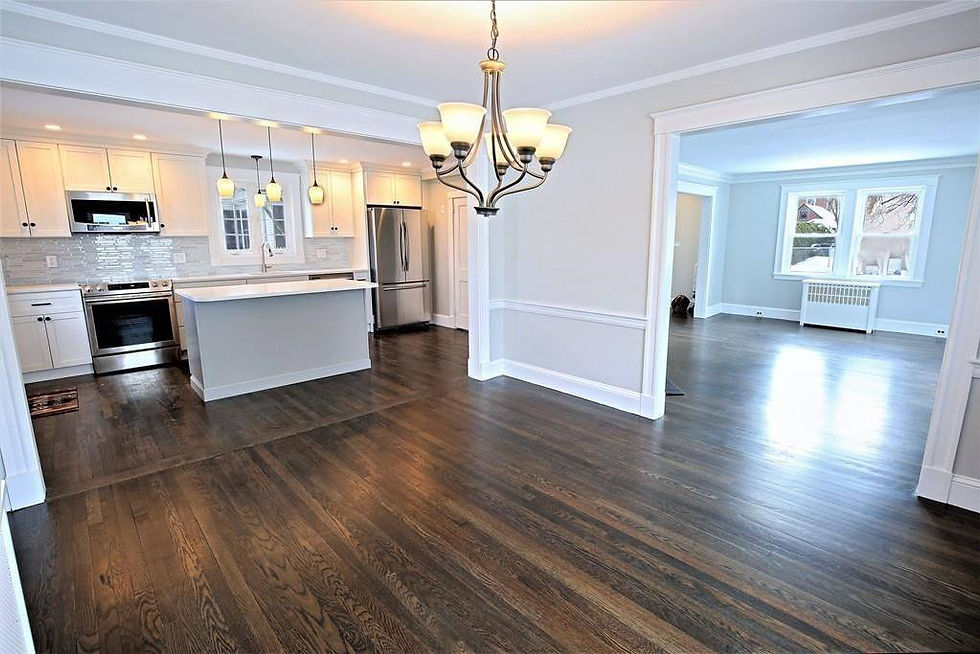WHICH IS BETTER? ENGINEERED HARDWOOD OR SOLID HARDWOOD FLOORING? - SUBMITTED BY CONNIE F.
- Thang Lam

- Aug 15, 2019
- 3 min read
Updated: Oct 11, 2019

Thanks, Connie, for the question. Both engineered hardwood and solid hardwood flooring are real wood flooring. Solid hardwood is engineered from a single piece of ¾ inch thick hardwood. Engineered hardwood flooring is made from multiple layers of plywood or high density fiberboard plus a thin hardwood wear layer on top (veneer).
The advantage of all solid hardwood flooring is that it can be sanded and refinished multiple times because it is so thick, making it last many years (80-100) if properly maintained. Engineered hardwood flooring, depending on what the sub layers are made out of and how thick the actual hardwood veneer (wear layer) is on top, can also be sanded and refinished. Most inexpensive and off-the shelf engineered hardwood sold at big box stores, however, usually can only be sanded between once, making it’s lifespan much shorter- 20-30 years. Some engineered hardwood can not be sanded at all, making the lifespan even shorter 15- 20 years. High-end (expensive) engineered hardwood flooring that can usually only be found at flooring specialty stores, however, is made up of multiple sub layers of plywood and a much thicker hardwood veneer top layer. In addition, this type of higher end flooring has multiple protective layers of finish, making it last much longer as is before needing to be refinished. This type of engineered hardwood can be sanded multiple times if needed, making it last almost as long as solid hardwood flooring. An example of this type is Appalachian Flooring's Engineered Hardwood in "Hard Maple Prestige Limestone" pictured in this post.
The advantage of engineered hardwood is that it can be installed over a vapor lock on top of concrete floors that are below grade (below ground level), whereas solid hardwood flooring cannot be installed below grade. Basements tend to have more moisture, and because solid hardwood flooring is made from a single piece of wood it expands and contracts with humidity, making it unsuitable for anything below the first floor of a building or home. Additionally, solid hardwood flooring cannot be installed directly on top of a concrete sub floor, which means that in many condominiums, it isn’t feasible to install solid hardwood flooring.
Engineered hardwood floors typically come in all the same plank sizes and wood species as solid hardwood flooring, and depending on the quality of the engineered hardwood, the price can be either cheaper than or more expensive than its solid hardwood flooring counterpart.
It is recommended that given how solid hardwood expands and contracts and the requirement that the subfloor be leveled prior to install, that a flooring professional install solid hardwood flooring. Although some proponents of cheaper engineered hardwood emphasis the ability of their flooring to be snapped together to “float” above a pad placed on the sub-floor, this type of engineered hardwood cannot be refinished and does not have the same resale value for your home as higher end engineered hardwood. High-end engineered hardwood is installed the same way as solid hardwood flooring and oftentimes, the installer will use a two-step installation process- glue + nail assist to ensure the flooring doesn’t move.
Prefinished solid hardwood (solid hardwood that has a finish and/or stain applied at the factory) and prefinished engineered hardwood floors are ready to go as soon as they are installed, so the timeline can be condensed for your project if you choose a prefinished option in either engineered hardwood or prefinished hardwood.
Given the costs associated with installing high-end engineered hardwood being comparable to solid wood flooring the main factor is whether or not there is humidity and/or condo association or building rules when making your decision.




Comments